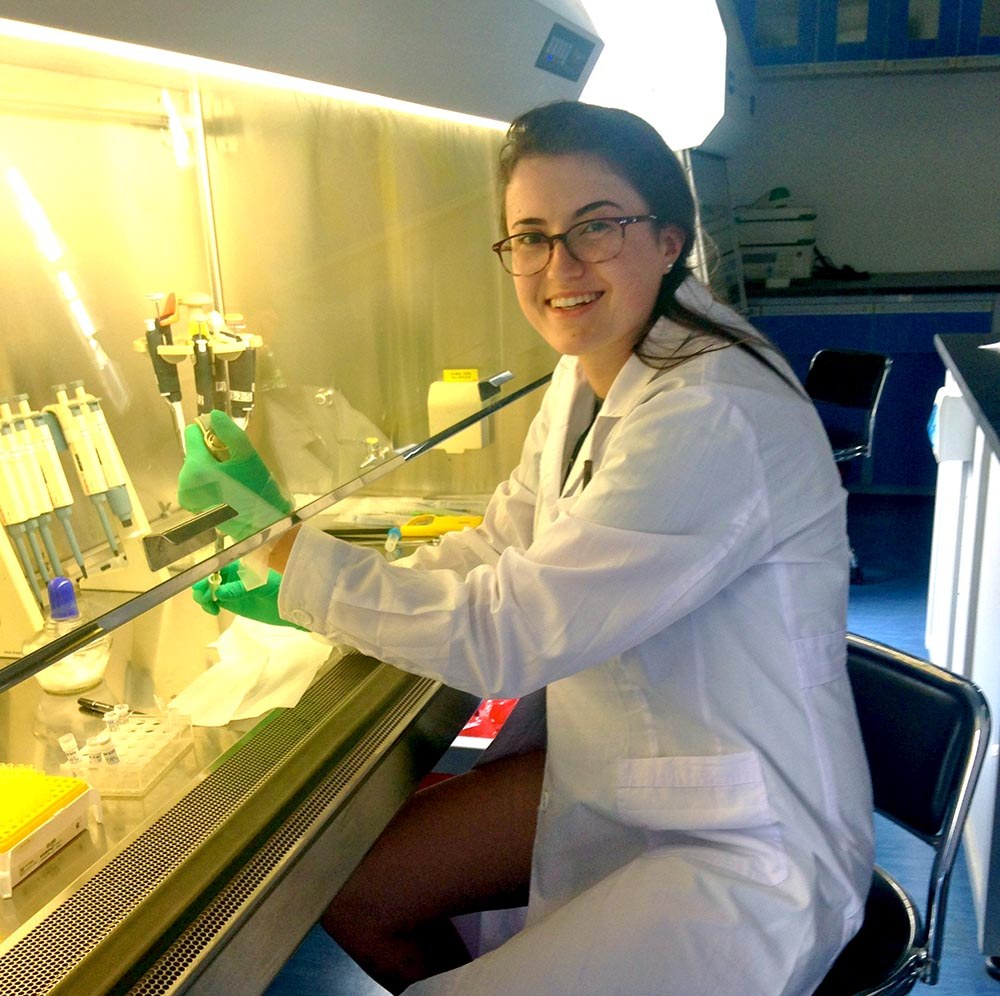Posted: May 25, 2016
What amazed me the most was how similar diagnostic techniques were performed even though we were over 10,000 miles from home.

Kelly preparing PCR assays in the lab at Guangxi Veterinary Research Institute
I was both nervous and excited leaving the small State College airport as I hugged my family goodbye in route to Tokyo, Japan as well as Beijing and Nanning, China for six weeks. Dr. Huaguang Lu and three other students who were in the College of Agricultural Sciences accompanied me on our journey across the world.
My goal was to do research at the Guangxi Veterinary Research Institute [GVRI] in Southern China where I would learn new techniques in pipetting, gel electrophoresis, Polymerase Chain Reaction [PCR] assays, animal disease investigations, diagnostic development, and disease control strategies. During week one I analyzed RTq-PCR avian cell sample results, prepared agarose gel, and learned how to use software to analyze my results. Later, I was able to prepare electrochemical immunosensors for Avian Influenza virus H5 specific antigens, which is also used to detect early onset cancer. With time, I advanced to using a GenomeLab Gene Expression Profiler [GeXP] in order to identify specific strains of Avian Influenza. What amazed me the most was how similar diagnostic techniques were performed even though we were over 10,000 miles from home.
In addition to the diagnostic skills I learned in the lab, I gained communication, leadership, and teamwork skills being in a new culture. It was difficult to overcome the astounding language barrier at first, given that our location was in rural South China. Many citizens living in Nanning have never seen an American before and almost nobody spoke English. With time, I learned new words and phrases in Mandarin and the researchers dramatically improved their English so that everyone could communicate effectively.
I learned how to use chopsticks on our very first day. Meals were served family style in which we rotated a glass table to select specific dishes to choose from. We drank steaming hot tea with each meal and were only allowed to drink boiling water for sanitary purposes, which did not help to fight off the scorching 120 degree summer days. Upon arriving to Beijing, Dr. Lu arranged for us to have our own driver so that we could visit tourist attractions. We were treated like royalty and I am so grateful to have met the amazing researchers from the lab and world-class scientists who shared their passion for improving both human and animal health.
I will never forget the day I saw the Great Wall of China. It consisted of miles upon miles of never-ending stairs. Tiananmen Square housed numerous sacred temples and underground tombs that we explored. The beautiful city of Guilin did not disappoint with elaborate caves, shopping districts, a four-hour Li River cruise, and a fun fish pedicure shop. We also took a weekend trip to Silver Beach at Beihai where we purchased pearls, swam in the South China Sea, and experience our first Karaoke room.
My internship in China has improved my life in more ways than I can count. I wish to obtain a Doctor of Veterinary Medicine degree and open my own clinical practice in the future. I am confident that what I learned at GVRI will guide me in the years to come. Not only have I enhanced my research capabilities, but also, I gained three amazing friends along the way.
Ag Sciences Global
Address
106 Agricultural Administration BuildingUniversity Park, PA 16802
- Email globalag@psu.edu
- Office 814-863-0249
- Fax 814-865-3055
Ag Sciences Global
Address
106 Agricultural Administration BuildingUniversity Park, PA 16802
- Email globalag@psu.edu
- Office 814-863-0249
- Fax 814-865-3055

